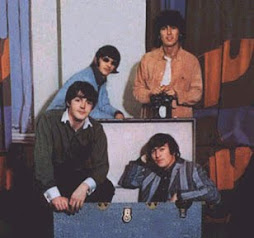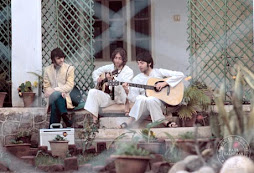Saturday, March 27, 2010
Revolution
John was not sure how he wanted go with the intention of his Revolution. He sang "don't you know that you can count me out-in!" He didn't know if he was for or against a Revolution. He was very much involved with Yoko at the time. He came back from India disillusioned from the Maharishi. He suspected the Indian guru of trying to seduce some women in the Beatles entourage. But if the truth be told, he was using that rumor as an excuse to get back to London to be with Yoko and take drugs. He had been experimenting with LSD and he missed the trips. Yoko was taking heroine and soon John would be showing up at Beatles recording sessions in a lethargic state. Paul would try in desperation to rally the Beatles to do the next take of Obladi Oblada and John would simply smile at him and laugh and as soon as he had the chance would go off with Yoko. Yoko would follow John into the bathroom. She never left him alone. She was sick and put a bed in the recording studio. The other Beatles were livid. Before Yoko, the Beatle wives and girlfriends were never allowed in the recording studio. Now here was Yoko, not only present in the studio, but sleeping in the studio and making critical comments. "Beatles do this. Paul play piano like this." Paul was shocked. Here was John's bird telling him how to play music.
Later on, when Paul recorded "Hey Jude" as a new Beatles single. John decided to re-record "Revolution" on the other side of the single making the disc a Double A single. Two hits on one disc. Paul's Hey Jude on one side. John's Revolution on the other side. He brought in Nicky Hopkins to play piano. Special care was taken to produce the lead guitar that was recorded directly into the mixing board. John overloaded the circuits and created a distinctive distortion sound. The opening machine gun sounding guitar riff is his signature. John Lennon was breaking the studio rules again. Many of the recording artists of that late 1960s time period were producing loud distorted guitar sounds. Eric Clapton. Jimi Hendrix. Now John was adding his own sound. He would produce a similar sound with "Cold Turkey" as a solo artist with Yoko and then aided by Eric Clapton, a friend of John and George. But here in "Revolution" the sound is John's sound. It is the machine gun of a Revolution, loud and violently abrasive. It was the perfect backdrop of student anti-war protests, LSD trips, hippies sleeping in city parks, people like John and Yoko living in sin and without a care in the world. The straight world was in shock. Who was this long haired freak wearing women's glasses sleeping with a Japanese woman? It was John Lennon. He was crazy and every kid loved him and every kid's parent hated him. He didn't need to say that the Beatles were bigger than Jesus. Soon a man named Charles Manson would be telling his followers to listen to the Beatles albums and listen to Revolution. And Charlie Manson and his followers thought he was Jesus.
Friday, March 5, 2010
Try to See it My Way
The Vietnam War was in full swing. Action '65 had taken it's toll the world was soon growing discontent with America's involvement in Vietnam and was questioning why the US troops were there, what exactly they were defending in an independent nation thousands of miles away and why women and children, even infants where being shot and killed in villages for little or no reason. The Mi Li Incident left little doubt that the US involvement in Vietnam had little to do with keeping South East Asia safe for democracy.
There was also an incident in which the Beatles were in conflict with their American distributor, Capitol Records that would literally butcher their master recordings and splice one track on to one album and one track on to another. Tracks from Help, Rubber Soul, and as yet unreleased tracks from Revolver where hastily butchered from their sources and Capitol created its own Beatles album called Yesterday and Today to capitalize on the chart success of Paul's hit single "Yesterday."
In any event, whether it was in protest of the baby killing done by American troops in Vietnam, or the resentment of the Beatles against Capitol Records for butchering their recordings by creating it's own albums to market in the US, the Beatles chose to use a photo of themselves in butcher clothing with dismembered dolls and scraps of meat and bloody clothing.
As President Johnson talked about the Domino Theory and how important it was to maintain democracy in Southeast Asia, the Beatles lyrics ran against the status quo of the establishment.
"Try to see it my way. Life is very short for fussing and fighting, my friend."
As George Harrison later reflected "it had just been a few years since Kennedy was killed. America was mad."
In less than five years, another Kennedy would be killed, along with Martin Luther King. The Butcher Sleeve as banned but the Beatles had come out with a statement. Brian was furious and it was only the beginning of John Lennon's comments that would soon cause a great deal of stress for John Lennon, Brian Epstein and the entire Beatles entourage.
John said that the Beatles were bigger than Jesus Christ. He went on to say that Christianity would fade, that Jesus was all right but his disciples were thick and ordinary.
Shortly before a concert in the American Bible Belt, the Beatles had received a death threat from the Ku Klux Klan. A fan set off firecrackers at a concert, and John and George looked at each other to see if either one of them had been shot. In 1980, John Lennon would be shot and killed by a crazy fan.
Tuesday, January 5, 2010
The Winter of Our Discontent
"Whatever it is that would please you," George said to Paul when he asked him to play his guitar differently on one of Paul's songs for Get Back.
Later on, John Lennon said that he liked the fact that Get Back was showing the Beatles as they really were at that time with "warts and all." Yet, it was Lennon who called in the aid of famed pop music producer Phil Spector to liven up the Get Back recordings and repackage them as Let It Be with strings, an orchestra, and a choir.
Monday, November 16, 2009
The Beatles Continuing Influence on Other Musicians, Part 2
I have also been seeing a lot of coffeehouse musicians playing Beatles songs as of late. On Friday night I heard a rendition of "Wait" off of the Rubber Soul LP that was decent hearing it with one acoustic and three part harmony.
I can't wait until the release of the movie "Nowhere Boy" which features the early life and teen years of John Lennon. The parts with John and Julia are terrific. Julia taught John how to play the guitar by using banjo chords which is nicely portrayed in this new movie coming out.
Monday, September 28, 2009
The Beatles Continuing Influence on other Musicians, Part 1
On YouTube, all a viewer has to do is enter a search for "Beatles on guitar" or "Beatles cover tunes" and a cache of material is brought forth.
I was doing a search a few months back and found this boy named Sungha Jung. Check out this kid's version of Paul McCartney's "Blackbird."
http://www.youtube.com/watch?v=hCT9xnlhldM&feature=fvw
I just found a related link to another musician covering Beatles material. This is Haley Legg covering John Lennon's "Dear Prudence."
http://www.youtube.com/watch?v=PmnzMsEBdyA&feature=rec-lis-watch-cur_emp-exp_r2
Here is a girl named Kiersten that did a cover of John Lennon's "Girl."
http://www.youtube.com/watch?v=7GClhrvtTzw&feature=related
Here is a duet act of two girls called Fiomily doing a cover version of John Lennon's "Help."
http://www.youtube.com/watch?v=dUVwbGdOKMU&feature=related
The material out there is an endless list. I could cull out about two dozen videos and line up a coffeehouse night of Beatles cover tunes.
Thursday, July 23, 2009
Comments on Liverpool Part 1 John Lennon
There is a critical incident from John's childhood in which Freddie had returned and was bonding with John and asked John to choose between living with him or his mother. John chose Freddie, and then seeing at how broken hearted his mother was, ran back to his mother. John was torn between his mother and his father. Both parents abandoned John, but he forgave Julia. This is explored more in John's solo song "Mother." John explained this incident in a Rolling Stone interview in 1970.
(Jann Wenner, Lennon Remembers, Rolling Stone 1970).
John and Paul became friends because Paul also lost his mother as a teen. John was raised primarily by Julia's sister, John's Aunt Mimi and his uncle. Paul was raised by his widowed father Jim who was an amateur musician and regular contributor to local productions around Liverpool. Paul later said that Sgt. Pepper's Lonely Hearts Club Band was partly based upon his father's jazz band that performed for theater productions in and around Liverpool.
Wednesday, July 22, 2009
Liverpool Part 1 John Lennon
John Lennon was born
(Here, insert story of John choosing between Fred and Julia. Sources Coleman’s Lennon, Rolling Stone’s Lennon Remembers, Beatles In Their Own Words, and Anthology.)
(1) John spent his early years with his mother and father near
























